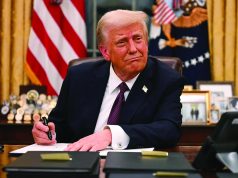President Htin Kyaw, supposedly fed up with his role that had essentially been ceremonial after being handpicked for the presidency by Aung San Suu Kyi – the de facto head of state holding the title of State Counsellor, resigned with immediate effect on March 21.
His departure was announced through a statement released from the President’s Office that said he wanted to have some rest from his duties and responsibilities. The announcement notified that a procedural process will be launched to elect a new president within seven working days in accordance with the constitution.
Htin Kyaw’s resignation followed months of speculation that he had been in ill-health after the 71-year-old was seen feeble at official functions. But the speculation was vigorously denied by government officials. His wife has denied that Htin Kyaw’s resignation was due to poor health during a recent interview.
Htin Kyaw, a childhood friend and longtime confidant of Aung San Suu Kyi, was nominated as president in March 2016 by the ruling the National League for Democracy (NLD) party, which won a landslide victory in November 2015 general elections. Widely seen as quiet and dependable, Htin Kyaw was handpicked to be the president by party chairperson and former opposition leader Aung San Suu Kyi in her move to address the constitutional barrier blocking her from the top office.
The selection of Htin Kyaw was forecast to become a largely ceremonial post from the start, since Aung San Suu Kyi vowed to stay “above the president” by grasping real power if her party would win the 2015 elections. Although the constitution vest extensive executive powers in the president and express that ‘the President takes precedence over all other persons throughout the Republic of the Union of Myanmar’, Aung San Suu Kyi exerted much of her influence through his presidency by creating the position of state counsellor for herself to exercise de facto power, making Htin Kyaw just a figurehead. And she has also taken the position of foreign minister in the Union Government.
Htin Kyaw’s resignation coincided the day Aung San Suu Kyi arrived back from Australia after attending the ASEAN-Australia Special Summit for two days. His resignation was promptly followed by that of Win Myint, another Aung San Suu Kyi loyalist and Speaker of Pyithu Hluttaw (House of Representatives), the lower chamber of Myanmar’s bicameral legislature. The departure of Win Myint from his post as the parliamentary speaker triggered widespread speculation of him to be Htin Kyaw’s replacement. Myanmar elects a president through parliamentary voting. First, three presidents-to-be are nominated to the parliament by three groupings; elected parliamentarians of the upper house, elected parliamentarians of the lower house and military-appointed parliamentarians of both houses. The military is endowed with a quarter of parliamentary seats by the constitution. Then the representatives of both houses including military personnel parliamentarians cast a ballot to decide who would become the president out of the three candidates. The nominee collecting highest per cent of votes becomes president, and the other two become vice president (1) and (2) according to the number of their votes. Htin Kyaw, who ascended to the presidency through the presidential nomination by lower house, was the 9th president of Myanmar and the only second president after Thein Sein following Myanmar’s transition from military rule to democracy. And he was also the first truly civilian president of Myanmar since the 1962 coup to have no connections to the military.
“We’ve been hearing that the president might take such step for months, so this is no surprise,” said Dr Khin Zaw Win, Director of the Tampadipa Institute, a Yangon-based policy advocacy and capacity-building organisation. “I think the new president will have to take some more responsibility from the state counsellor. It was a mistake for her (Aung San Suu Kyi) to centralise so much authority, leaving Htin Kyaw as a puppet,” he added. Htin Kyaw, seen completely loyal to Aung San Suu Kyi to stand firmly by her side against Myanmar’s knotty political backdrop, is the son of revered poet and literary scholar Min Thu Wun, and he himself also is an occasional writer under the pseudonym of Dala Bahn. Prior to the presidency, he helped run Aung San Suu Kyi’s charitable organisation named Daw Khin Kyi Foundation established in memory of her mother, the wife of Myanmar’s independence hero General Aung San. Before joining the Daw Khin Kyi Foundation as a committee member, Htin Kyaw was a civil servant. He held positions in the finance and national planning and foreign affairs ministries in the late 1970s and 80s and also used to be a university teacher before retiring from government service.
Born in former capital city of Yangon, Htin Kyaw enrolled at the Rangoon Institute of Economics after completing high school from English Methodist High School in 1962.
He then gained an M.Econ degree in 1968. Htin Kyaw pursued further studies on a scholarship to the Institute of Computer Science, University of London in 1971– 1972 and attended computer studies in Asia Electronics Union, Tokyo in 1974, completing his second master’s degree in 1975. He also attended a course at the Arthur D. Little School of Management in Cambridge, Massachusetts, in 1987. He served at the University Computer Centre as a programmer/system analyst in 1970s.
Htin Kyaw’s father Min Thu Wun won a seat in the 1990 elections. His fatherin-law U Lwin was co-founder of the NLD, acting as the secretary of the party from 1995 to 2010. Htin Kyaw has been married to Su Su Lwin since 1973. Su Su Lwin, the daughter of U Lwin, is the incumbent Pyithu Hluttaw (House of Representatives) parliamentarian for Thon Gwa Township constituency and a member of the International Relations Committee of that House. Htin Kyaw became the president of Myanmar on March 30, 2016. He is 71 when resigns from his position as president.
Myanmar political analyst Richard Horsey said the choice for Htin Kyaw’s successor had to be from Aung San Suu Kyi’s “inner circle of trusted loyalists”. “The president has full executive authority under the constitution, so it requires a personal pact in order for Aung San Suu Kyi to maintain the situation where she is the actual seat of power,” he said.










